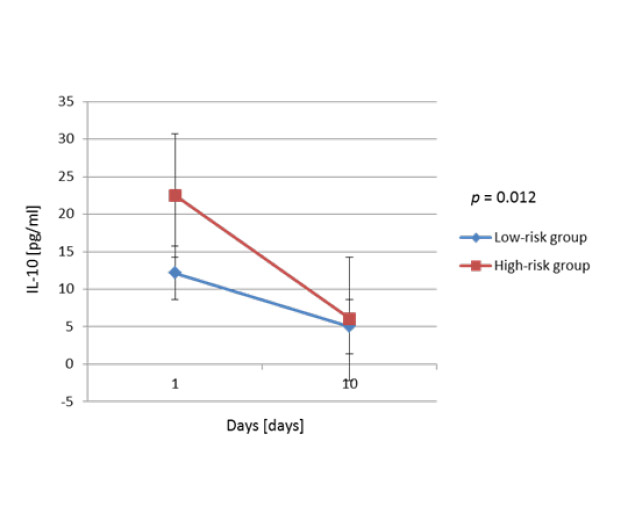Interleukin response in patients treated with abbreviated laparotomy for severe intraabdominal sepsis
Citokinski odgovor pri bolnikih, zdravljenih z metodo odprtega trebuha zaradi hude sepse, povzročene z dogajanjem v trebušni votlini
DOI:
https://doi.org/10.18690/actabiomed.238Keywords:
intraabdominal sepsis, surgery, negative wound pressure therapy, interleukin-6, interleukin-10Abstract
Background: Pro- and anti-inflammatory cytokines play an important role in abdominal sepsis. Studies suggest that the anti-inflammatory response is more detrimental to the patient with abdominal sepsis than the initial pro-inflammatory response. We therefore studied the serum levels of pro-inflammatory and anti-inflammatory interleukins in patients with abdominal sepsis treated by abbreviated laparotomy.
Methods: We performed a prospective study of 42 patients treated by abbreviated laparotomy. The patients were divided into a high-risk (more than two procedures before abdominal closure) group (24 patients) and a low-risk (two or fewer procedures) group (18 patients). The differences and correlations between the serum levels of pro-inflammatory and anti-inflammatory cytokines on days one and ten after the initial procedure were assessed.
Results: The mortality was significantly higher in the high-risk group (41.7% vs. 5.6% in the low-risk group; p = 0.012). IL-10 serum levels were significantly higher in the high-risk group (22.5 pg/mL (IQR 5.25)) compared to the low-risk group (12.15 pg/mL (IQR 6.725)) (p = 0.012). Age was significantly correlated with mortality (p = 0.007). The logarithmic value of IL-10 serum levels on day one (HR: 2.5; 95% CI: 1.109–5.638; p = 0.027) and the IL-10 cut-off value (HR: 3.816; 95% CI: 1.047–13.910; p = 0.042) were significantly correlated with worse disease course in multivariate analysis.
Conclusions: Patients who exhibit a greater anti-inflammatory response on day one are at increased risk of a protracted course and higher mortality. IL-10 serum levels on day one after surgery predict a worse disease course in these patients and could be a useful marker of abdominal sepsis.
Downloads

Downloads
Published
Issue
Section
License
Copyright (c) 2022 Tomaž Jagrič, Maksimiljan Gorenjak, Evgenija Homšak, Bojan Krebs (Author)

This work is licensed under a Creative Commons Attribution 4.0 International License.